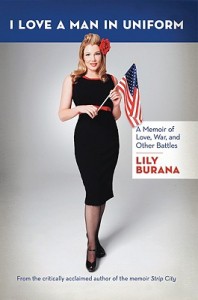In 2004, Lily Burana wrote a book called Strip City, a memoir told as a cross-country road trip from strip club to strip club, reconciling her past as a dancer in those clubs with her career as a writer and her childhood in suburban New Jersey.
Burana is back with a new memoir about her life as a military wife, called I Love a Man in Uniform, a thoughtful and at times heartwrenching look at a life that once again, no one would have predicted for her: waiting at home for her husband to come back from deployment. She spoke to Sarah Jaffe of GlobalComment about her book, her life as an Army wife, and the unexpected similarities between her former career and that of her husband.
Sarah Jaffe: Can you give us some background on the book and your decision to write it?
Lily Burana: When I married my husband in 2002, I read every Army wife book in print. Almost all of them are more or less “how-to” books. What seemed to be lacking was a book that wasn’t “how to” but rather, “what it’s like” from the newbie wife perspective. When I started laying down all the things I’d encountered in my relatively new marriage–deployment, reintegration, moving, dealing with living in the “suburbia on steroids” culture of an Army post, post-traumatic stress disorder, and my own thoughts on challenging military developments like Abu Ghraib, I found I filled up a book’s worth of material pretty quickly.
I didn’t want to write from a position of queenly seniority. Instead, I thought I’d write from the point of view of a total neophyte, something kind of sloppy and dishy and confessional. What it’s like to meet bitchy Army wives. What it’s like to go on a near-starvation diet because of the stress of your husband being in a war zone. What it’s like to hear your husband tell you about times he’s seen thousands of bodies burned and blown into smoking bloody chunks.
It’s not a book that you would, say, give to your mom or to a commanding officer, but something you’d want to share with your friends. I figured most readers–those who are non-military conversant–would find that easy to relate to.
SJ: You came from a punk rock background, and that usually comes with a healthy distrust for authority, but the military is the ultimate hierarchical structure. Did that become a problem for you?
LB: The hierarchy doesn’t bother me, simply because in the military, you rise in rank over time, with proof of experience, which seems perfectly fair! It’s not like you ever end up gnashing your teeth over some 22 year old whiz kid coming out of nowhere and getting promoted to Colonel–that doesn’t happen! Unlike, say, arts and media, where you might see your super-genius friend who labored over her novel for a decade go without a publisher while some hack ends up driving a Porsche. There are no vagaries of the marketplace in the military, that’s for sure! So in a way, that is refreshing.
What proved to be a challenge was the formality of the Army culture. Even as a wife, there’s a constant feeling of being observed and evaluated, so that “fun” cookout on post may actually be an assessment of you and your husband’s suitability for a certain job. Like, say, Position X has a very social component to it, so your husband’s boss will be watching you interact with the other families, thinking, “Can Mike and Lily navigate that world well? Are they good with people? Hmmmm.” And there you are assuming you’re just bolting down franks and beans with the other unit families.
Being an Army wife can feel very much like a prolonged performance. For example, one of the first things you have to learn is how to talk to people. While your husband has to call senior officers “sir,” you do not. The senior guy may tell you to call him “Jim,” or whatever, which is fine if you have just him and his wife over to eat, but in a mixed group of people, you still have to call him Colonel Smith. So if I screwed that up by accident, I’d beat myself up for it for days on end.
There are a billion rules like this–many of which are unwritten, and ALL of which are not taught to you before marriage. And no matter how chummy the higher-ups may be, you have to recognize the bounds etiquette.A super-senior guy may want to feel included in your wacky social laxness, but no matter what, you don’t call a general “Dude.” Unless that’s his name: General Dude.
SJ: Has being a military wife changed the way you look at U.S politics?
LB: Right now –while the Army is dealing with an exponential increase in substance abuse, and an alarming rise in PTSD cases and suicides — the news coverage has plummeted. It is very upsetting to me, but this war burnout is very real among the American public. And that is reflected in the headlines.
Also, I’m disgusted that there are days of coverage about those Marines who allegedly threw live puppies over a cliff, but none about my former neighbor at West Point who, when he was a battalion commander in Iraq, arranged to have an Iraqi boy with a birth defect sent to the United States for surgery that would fix the defect and radically improve the child’s quality of life. I can’t not be offended by that. I guess to some people, it’s more exciting to see soldiers as sadists.
SJ: Back when we spoke about Strip City, I asked you about a quote from that book, “I’m not the one performing, so my sense of what’s appropriate is not germane. I don’t get to make that call.” Do you feel that applies to your situation now and the situation of U.S. soldiers?
LB: Great question! When you’re a soldier, if the President says “go to war,” you go, no matter what! I couldn’t sign off on something that requires such a surrender of autonomy, but I can’t say that I am really in the position to determine whether or not that’s a good decision for someone else. There are rewards to life in the service that I, and others like me, will never know, and I’m in no position to tell someone that the sacrifices they’d make to savor those rewards aren’t worth it.
SJ: You’ve written twice about relationships with men that fit into outsize male stereotypes, and of course written about being that outsize female stereotype. Do you see any similarities between being in the military and your former job?
LB: Hell yeah–lots of similarities! Chief among them is the fact that both lines of endeavor are the province of youth—they’re jobs for the young, nimble, and daring. The extremes that either job demands make the fire of youth a requirement–between the danger and the physical demands, you don’t really want a 50 year-old on the front lines or at the tip rail!
Ironically, either job can rob you of your youth, too–naivete goes on the chopping block pretty quick, and you see things that “civilians” never do. I do think soldiers and strippers bond among each other quite fiercely because of this. You tell each other “war stories” that you wouldn’t share with people who hadn’t walked in your boots, or danced in your 6-inch Lucite platforms.
And both jobs are rife with stereotypes, positive and negative. You’re seen as some strange mythic creature based upon what you do for work–hero or wretch, sex god or scumbag. For good or ill, you’re super-identified with your choice of job in a way that, say, a receptionist or salesman would not be.
Also, people don’t mess with soldiers, and they don’t mess with strippers. No one has ever gotten in my face, and I doubt it would ever happen. Most folks have the good sense to give you plenty of personal space when they believe that you can hand them their ass on a platter. They’ve seen “Showgirls” and assume that a dancer WILL get all Crystal Connors on you if need be!
SJ: In another interview, you said that this book was far more revealing than Strip City–which had its own examination of an unlikely relationship at its core along with the journey as a stripper. Can you elaborate on that?
LB: Stripping is very much a job of illusions. Really, the job comes down to moving and acting and dressing in a sexy fashion, and then being nice to customers for ten minutes at a time. There’s the suggestion of exposure, because you’re nude a lot—but nude and naked aren’t the same thing. Customers might know where your secret birthmark is, but they don’t know your secrets, since so much of what you share with them is theater. I was pretty honest about how it feels to perform that charade, and also about how the strip club business works, but there was a lot more to tell. I just didn’t realize it at the time.
In I Love a Man in Uniform, I speak very frankly about the reason I had a nervous breakdown after I got married. I had some crappy times in my childhood that inspired me to live my life half-hidden, and once I was married–to someone who would see me all the time, in all kinds of lighting (literally and metaphorically), I couldn’t hide any more and it totally flipped me out. One of the big challenges of the book was to write honestly about how post-traumatic stress disorder affects women who were abused in childhood and how it can lead you to living inside some tough-chick role to protect yourself. It drove me to the very blackest depression, where I thought I’d really rather die than be seen, because death seemed the safer choice.
There’s not much written about what PTSD looks like, how it manifests in insidious ways, and how you treat it. Since I did have effective treatment, I counted it as an act of service to get over any self-consciousness I felt about being seen as a big bag ‘o’ suicidal crazy and be honest about getting help, so people could see that recovery is possible.
SJ: Since I’ve asked the stripping questions, I have to ask if you get many questions about regretting your past now that you’re mainstream-acceptable.
LB: Nope, sure don’t. One woman at The Washington Times talked to me about it, and it was fine–I was able to speak freely about the downside of stripping, and why, when I quit, I was quite ready to move on. But that’s not quite the same as regret. Honestly, I don’t think I’m considered mainstream acceptable yet. Maybe alt-mainstream acceptable, as opposed to, say, Department of Defense or Capitol Hill acceptable. If I wanted to join the military and climb the ladder to a high rank, or to run for public office, I’d pretty much be screwed.
SJ: What are your plans now, after two memoirs and a novel?
LB: Turn the novel into a screenplay (you can laugh at my naivete now, go right ahead. It’s perfectly okay!). That’s what I was planning to do before I got distracted by I Love A Man In Uniform. Now I’m ready to trade in combat boots for cowboy boots. I’m ready for big skies and bruises and mud and horses and girls with tattoos and guys with sad blue eyes and busted lips. I need some honkytonk at this point, for real.
SJ: Finally, on a fun note, tell me about your burlesque classes for military wives.
LB: Oh, it’s so simple! Operation Bombshell is my DIY pet project. I travel to military posts around the country and teach a nifty, easy burlesque class to wives of deployed soldiers. It’s all about helping stressed out women have a good time by discovering their inner bombshell. Every woman’s got one, right?
Wives request me for a class, then I travel to where they are, and teach them a cool, old-school routine in about an hour. It’s entirely funded by donations, and my friend Laura Byrnes from Pin Up Girl clothing in LA helped organize a benefit for me at Trader Vic’s in May. Diablo Cody hosted it, and Masuimi Max, Ms. Redd, and La Cholita came out to perform. We packed the place and raised a good amount of money that will keep me going for a while.
I know teaching a burlesque class may not seem like any great shakes (sorry, pun!), but it’s my means of supporting fellow spouses, who do so very much for other people. I know when my husband was deployed, a chance to get out of the house for a bit, to hang with other wives and do something girly and frivolous, would have lifted me up. Glamour heals, I think, and that’s a theory that even economists can support. There’s the “lipstick index,” that shows even in recessionary times, women will splurge a bit on a nice lipstick. Proof positive that a little feminine distraction goes a long way toward making a girl feel good. A fairly simplistic philosophy, but I believe, my fellow Americans. I believe.


